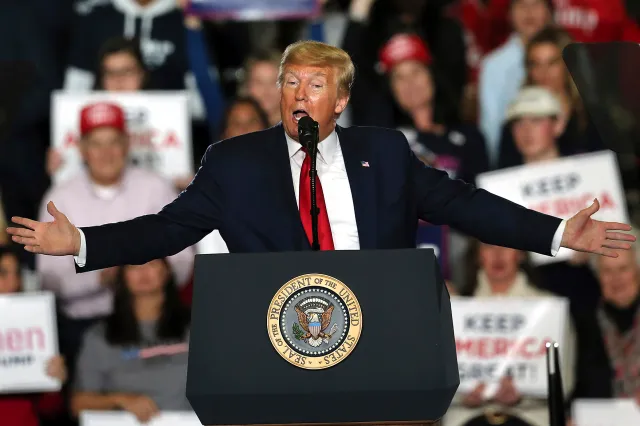-
Jonathan Bailey Fans Under Fire Over Comments About His Sexuality - 11 mins ago
-
‘My Baby Girl Has Passed to Glory,’ Says Father of Guard Soldier Killed in D.C. Shooting - 13 mins ago
-
Mets Acquire Ex-White Sox, Yankees Pitcher After 3-Year MLB Hiatus - 46 mins ago
-
A Hong Kong Fire Survivor’s Escape, in His Own Words - 57 mins ago
-
Aldi recall: Customers told discard Christmas products ‘immediately’ - about 1 hour ago
-
Officials Had Been Warned for Over a Year Before Hong Kong Fire - 2 hours ago
-
Neighbors Spend Months Trying To Save Stray Dog, Get ‘Thanksgiving Miracle’ - 2 hours ago
-
Andriy Yermak, Zelensky’s Chief of Staff, Resigns - 2 hours ago
-
All In With Ashley: NFL Rankings Thanksgiving Special - 3 hours ago
-
Shelter Dogs Receive Special Thanksgiving Gift, Their Response Is Adorable - 3 hours ago
Trump No Longer Held Criminally Accountable for Trying To Overturn Election
Five years after Donald Trump sought to overturn the results of the 2020 presidential race, the final criminal case related to those efforts has been dismissed, meaning the president will face no criminal trial over actions prosecutors once said were supported by strong evidence.
With Georgia’s racketeering prosecution now closed and federal election-interference charges abandoned due to presidential immunity, Trump faces no remaining criminal exposure for actions that prosecutors once argued constituted a broad attempt to unlawfully stay in power.
Newsweek contacted Trump’s personal legal team for comment via email outside of normal office hours on Thursday.
Why It Matters
Despite years of investigation and detailed allegations that Donald Trump and his allies attempted to overturn Georgia’s 2020 election results, the collapse of the state’s racketeering case—combined with federal prosecutors’ abandonment of their own charges due to presidential immunity—means the president will face no criminal trial.
The outcome underscores how procedural setbacks, political timing and constitutional protections shielded Trump from prosecution, raising broader questions about accountability and the limits of the legal system when the defendant is a sitting president.

What To Know
Why The Georgia Case Collapsed
The Georgia case, widely seen as the last active criminal proceeding tied to the 2020 election, was dismissed on November 26, 2025, when Fulton County Superior Court Judge Scott McAfee ordered the matter “dismissed in its entirety.”
The move followed state prosecutor Peter Skandalakis’s decision to halt the case after assuming responsibility for it earlier in the month.
“In my professional judgment, the citizens of Georgia are not served by pursuing this case in full for another five to ten years,” Skandalakis wrote in his filing requesting dismissal.
He added that the prosecution would be “best pursued at the federal level,” but acknowledged that federal action was no longer feasible because former Special Counsel Jack Smith had already been forced to drop his election-interference case after Trump’s reelection and following the Supreme Court’s expansion of presidential immunity.
Skandalakis’s review emphasized the seriousness of the conduct underlying the indictment.
The strategy pursued by Trump and his allies, he wrote, “quickly shifted from a legitimate legal effort into a campaign that ultimately culminated in an attack on the Capitol,” adding that the events were “conceived in Washington, D.C., not the State of Georgia.”
Still, he concluded that continued prosecution was impractical, citing logistical, constitutional, and evidentiary problems, as well as limits on compelling a sitting president to appear in court.
Legal Setbacks And Structural Complications
The Georgia indictment, filed in August 2023, alleged that Trump and 18 co-defendants conspired to overturn Joe Biden’s victory in the state.
The case drew national attention in part due to the recorded January 2021 phone call in which Trump asked Georgia Secretary of State Brad Raffensperger to “find 11,780 votes.”
Four defendants, including attorneys Sidney Powell and Kenneth Chesebro, ultimately pleaded guilty and agreed to provide truthful testimony in future proceedings.
Yet structural complications overwhelmed the case.
The disqualification of Fulton County District Attorney Fani Willis over an “appearance of impropriety” relating to her relationship with a special prosecutor had already delayed proceedings and complicated the path forward.
Skandalakis, the nonpartisan official tasked with selecting a new prosecutor, assumed the case himself only after he was unable to recruit anyone else to take it on.
He ultimately determined that moving ahead would not “serve the interests of justice.”
Federal Barriers And The End Of Accountability
The dismissal mirrors developments at the federal level.
In January 2025, Smith released a partially public report stating that “the admissible evidence was sufficient to obtain and sustain a conviction at trial,” and that Trump “would have been convicted…if he had not successfully been re-elected in 2024.”
Smith wrote that the Constitution’s prohibition on prosecuting a sitting president was the sole factor preventing the case from moving forward.
Trump sharply rejected Smith’s findings, calling the prosecutor “deranged” and the report “fake,” as reported by the BBC.
He also celebrated the Georgia ruling, posting that “LAW and JUSTICE have prevailed” and referring to the prosecution as a “witch hunt.”
The end of the Georgia prosecution closes one of the last avenues for potential accountability related to the 2020 election.
Georgia State University law professor Anthony Michael Kreis argued that the state case had offered “an opportunity for justice and reconciliation and a kind of truth-telling that has been squandered,” as per NPR Illinois.
With no remaining indictments on the matter and constitutional protections now shielding him from federal prosecution while in office, the dismissal marks the effective conclusion of efforts to hold Trump criminally liable for attempting to overturn the 2020 election.
Five years after the events in question, Trump is no longer facing criminal accountability for them.
What People Are Saying
President Donald Trump on hearing he is no longer to be held criminally accountable called for Fulton County District Attorney Fani Willis to be prosecuted, saying: “Now she should be prosecuted,” Trump said. “What Fani Willis did to innocent people, patriots that love our country… she should be put in jail. She’s a criminal,” and in defending his co-defendants and portraying the prosecution as persecution, said: “Those people have been so unfairly dragged into this… These are high-quality people who don’t even know why they were brought in.”
What Happens Next
With the Georgia prosecution dismissed and federal charges barred by presidential immunity, all criminal avenues related to Donald Trump’s efforts to overturn the 2020 election have effectively closed, leaving no remaining path for legal accountability.
As a result, the aftermath shifts entirely from courts to the political arena, where voters—not prosecutors—will determine any consequences.
The broader impact now falls on the system itself, as lawmakers, legal scholars and election officials grapple with the precedent that a president can avoid trial for alleged election subversion through procedural delays, constitutional protections and the timing of electoral victory.
Source link


















